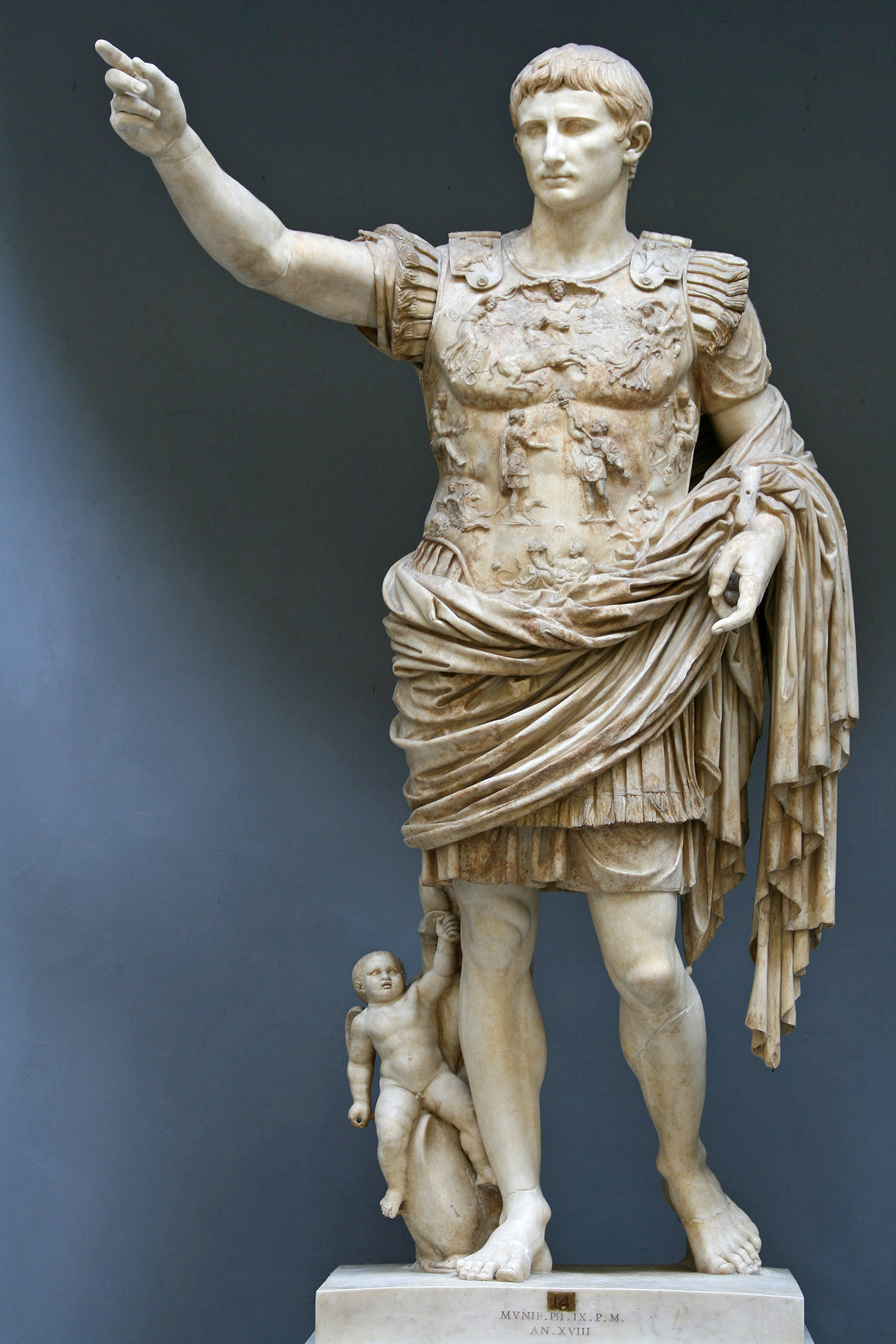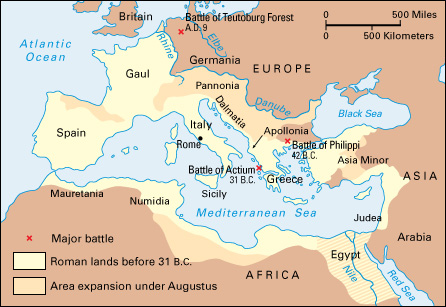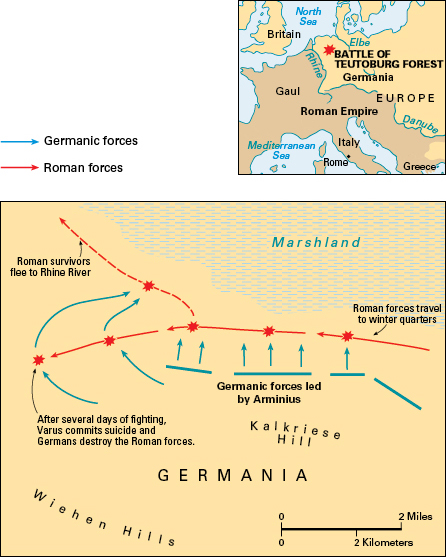Augustus << aw GUHS tuhs >> (63 B.C.-A.D.14), meaning the revered, was the name given to Gaius Julius Caesar Octavianus, also called Octavian, when he became the first emperor of Rome in 27 B.C. That year, the era of the Roman Empire began.

Octavian was born in Rome on Sept. 23, 63 B.C. His father was Gaius Octavius, a wealthy banker. Julius Caesar was his great-uncle. In his will, Caesar adopted Octavian and made him his heir. After Caesar was assassinated in 44 B.C., Octavian took the name Gaius Julius Caesar Octavianus. He was 19 years old. The famous orator Cicero helped Octavian legalize his adoption over the objections of Mark Antony, Caesar’s chief lieutenant.
Rise to power.
After Caesar’s death, Mark Antony had taken control of Rome. Octavian raised an army of Caesar’s veterans to fight Antony and defeated him in 43 B.C. Octavian forced the Roman Senate to elect him one of Rome’s two consuls (chief government officials). He then came to an agreement with Antony. The two men formed a political alliance, known as the Second Triumvirate, with Marcus Aemilius Lepidus, the pontifex maximus (chief priest) of Rome’s state religion. The First Triumvirate had consisted of Julius Caesar, Pompey the Great, and Marcus Licinius Crassus. Under the Second Triumvirate, Antony ruled Rome’s eastern provinces, and Octavian ruled the western ones. Lepidus controlled Rome’s territories in Africa.
The Triumvirate had more than 2,000 of its opponents killed. In 42 B.C., Octavian and Antony fought and defeated Marcus Junius Brutus and Gaius Cassius Longinus, Caesar’s chief assassins, at Philippi, in Macedonia. Sextus Pompey, the son of Pompey the Great, posed another threat. Octavian’s chief adviser and general, Marcus Agrippa, fought and defeated Sextus Pompey’s military forces in 36 B.C. That same year, Octavian and Antony removed Lepidus from the Triumvirate. Octavian and Antony then turned their armies against one another.
Since about 41 B.C., Antony and Queen Cleopatra of Egypt had been lovers and allies. Octavian portrayed this relationship as a threat to Rome and used it to turn public opinion against Antony. In 32 B.C., he went to war against Antony for control of the Roman world. Marcus Agrippa defeated Antony and Cleopatra’s forces at sea at the Battle of Actium, off the west coast of Greece, on Sept. 2, 31 B.C. The pair fled to Alexandria, Egypt, where they both committed suicide. Egypt became a Roman province in 30 B.C.
Emperor of Rome.
In 27 B.C., the Senate gave Octavian the name Augustus. Three arrangements with the Senate, in 27, 23, and 19 B.C., gave Augustus legal power to direct Rome’s civil and military affairs as the princeps (leading citizen). In 12 B.C., Augustus also became pontifex maximus. The Senate served as an advisory body and governed Rome’s more peaceful provinces. Through governors, Augustus controlled provinces that required extra troops or, like Egypt, were very wealthy.

Augustus divided the city of Rome into 14 administrative areas. He allowed Rome’s equites (the business class) more influence in the running of the city and the empire. He also established the Praetorian Guard, his bodyguard.
Augustus used coins, monuments, and statues as propaganda to emphasize his high position. He claimed to be descended from the god Mars and the goddess Venus. His ancestors included the Trojan hero Aeneas. Some Romans in the provinces worshiped Augustus.
Expansion of the empire.
Under Augustus, the empire doubled in size. He finally brought all of Spain under Roman control. In southeastern Europe, he advanced the empire’s frontier north to the Danube River. In Germany, his army strove to push the frontier north to the Elbe River. But Germans defeated the army at the Battle of Teutoburg Forest in A.D. 9.

To better manage Roman lands, Augustus extended Rome’s highway system to the remotest parts of the empire. Colonies made up of veteran troops brought Roman civilization to newly conquered territories and helped maintain loyalty to Rome.
Other achievements.
The reign of Augustus is sometimes called the Augustan Age. It ushered in a period of peace and prosperity after years of civil unrest.
Augustus restored monuments and buildings that had fallen into disrepair. He ordered the construction of aqueducts, bridges, roads, and a new forum (center of government). Sculptors created beautiful works in marble to decorate the city. Augustus had the Tiber River dredged to prevent flooding and improved Rome’s supply of grain. These acts provided jobs for poor Romans and improved their living conditions. Augustus revived ancient religious rituals and built new temples. He promoted the growth of the senatorial and business classes by passing laws against adultery and rewarding those who married and had children.
Augustus and other statesmen of his time patronized the arts and literature and helped them flourish. Famous Roman authors of the Augustan Age included Horace, Livy, Ovid, Propertius, Tibullus, and Virgil. Augustus was also a writer himself, known for his simple, direct style.
Augustus was successful during his long reign partly because of his patience in acquiring power and partly because of his diplomacy with his friends and enemies. He died of old age on Aug. 19, A.D. 14. His remains were placed inside a great tomb called the Mausoleum. After his death, Augustus was made a god and worshiped in Rome.
